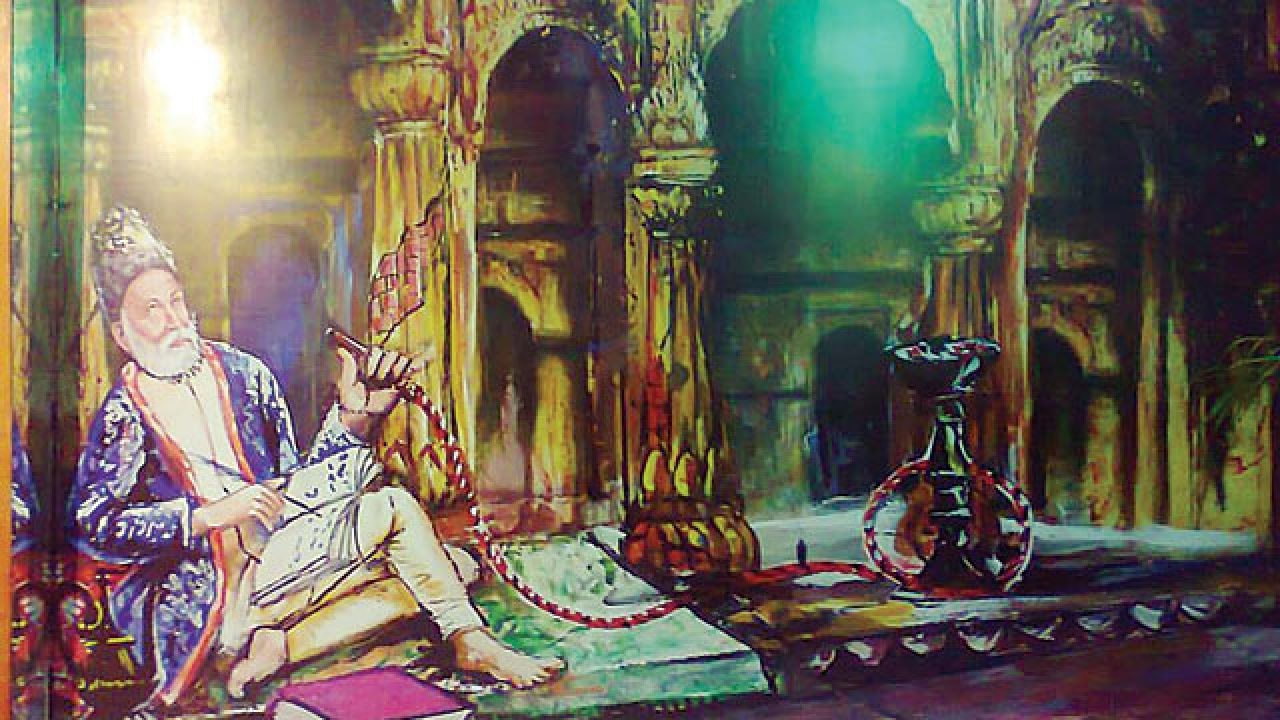
Wit that disarms with simplicity, words that leave one in awe, awe of the sublime rhymes, of words that have more than one obvious meaning, laced with veiled irony and then the awe of the deeper truth that finally dawns upon us. Nothing contrived, no advice, just a graceful conversation with the self, as life unfolds and presents itself. And it did harshly for Ghalib, who was born as Mirza Asadullah Beg Khan at the end of the Mughal era.
Ghalib left us a treasure of verses that are no less philosophy than they are the highest form of poetry to the ears. Poetry so sublime that any language if it were a sentient would covet to be its medium. Urdu was the chosen one and Ghalib brought it to life.
Ghalib’s spiritual views were well earned. A struggle for living where existence was a challenge. Debt ridden and the loss of all seven children, Ghalib’s words seem ethereal, addressing and questioning life’s existence. The prison of life and the bondage of grief are one and the same, Before the onset of death, how can man expect to be free of grief?
Those who knew him well were in complete awe of his talent. They would immediately hand him a paper and a quill as soon as he pulled a shayari out of thin air, or his spoken word would be lost forever like thousands of his unrecorded gems.
Ghalib was a devout Muslim and a large part of his poetry did praise Prophet Mohammed. To Ghalib, purity of belief and faith help in seeking God and is more important than religious practices, which he thought were enslaving a man’s need to be free to seek the divine on his own terms. He was wary of religious leaders and their interpretations of the scriptures. He often addressed them in his works.
Look deeper, it is you alone who cannot hear the music of his secrets. Ghalib believed that religions were just different paths to a common spiritual goal. He believed in a secular society and had a high regard for Hinduism.
Once on receiving barfi on Diwali his friends pointed out on how could he enjoy a Hindu sweet. In humor, he started a discussion to ascertain the religions of various other sweets. “In the Kaaba, I will play the shankh (conch shell), In the temple I have draped the ahraam (Muslim robe),” he said.
Though Ghalib never intended to be a Sufi, but his couplets draw inclination towards it and we see Sufism in his writing, where all boundaries dissolve as seen in the Indian text Vedanta, very similar to the Sufi philosophy of Wahdat-al-wajood (Unity of Being). What we have often seen is that Ghalib wandered through life in search of its meaning.
Similarly, one of the famous or known Sufis of all times Rumi, a 13th-century Persian Sunni Muslim poet was a great source of spiritual wisdom, his unique philosophy softens the harshness of living. “Don’t grieve. Anything you lose comes round in another form,” Rumi said.
Ghalib is a treat for the senses, he sets you on a journey of discovery of seeing the deeper meaning of life. He is also probably the more popular one and can be quoted in most situations. Sooner or later one comes around to Ghalib and discovers the beauty and simplicity of his thoughts and writings. He is no less a mystic or saint.
Yeh Masail-e-Tasawwuf..
Yeh tera bayaan Ghalib,
Tujhe hum wali samajhte,
jo na baadakhwaar hota
which translates in english to (the way you talk of philosophy ..the mystical way in which you explain it.. You would have been considered a saint or God himself…If only you did not drink so much.)
(The writer is a filmmaker lost in the process; he is currently trying to find the meaning of life through the couplets of Ghalib and Kabir)